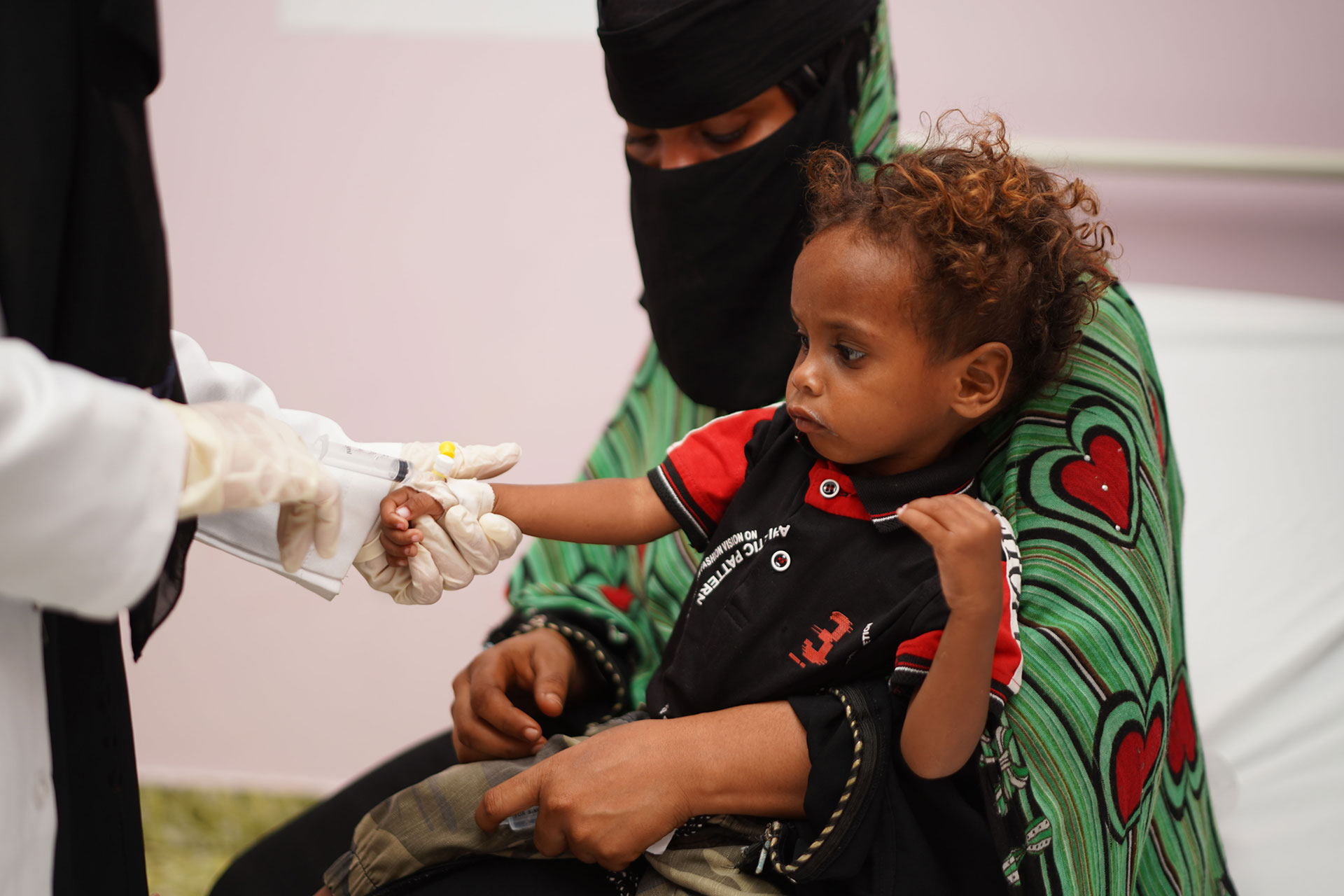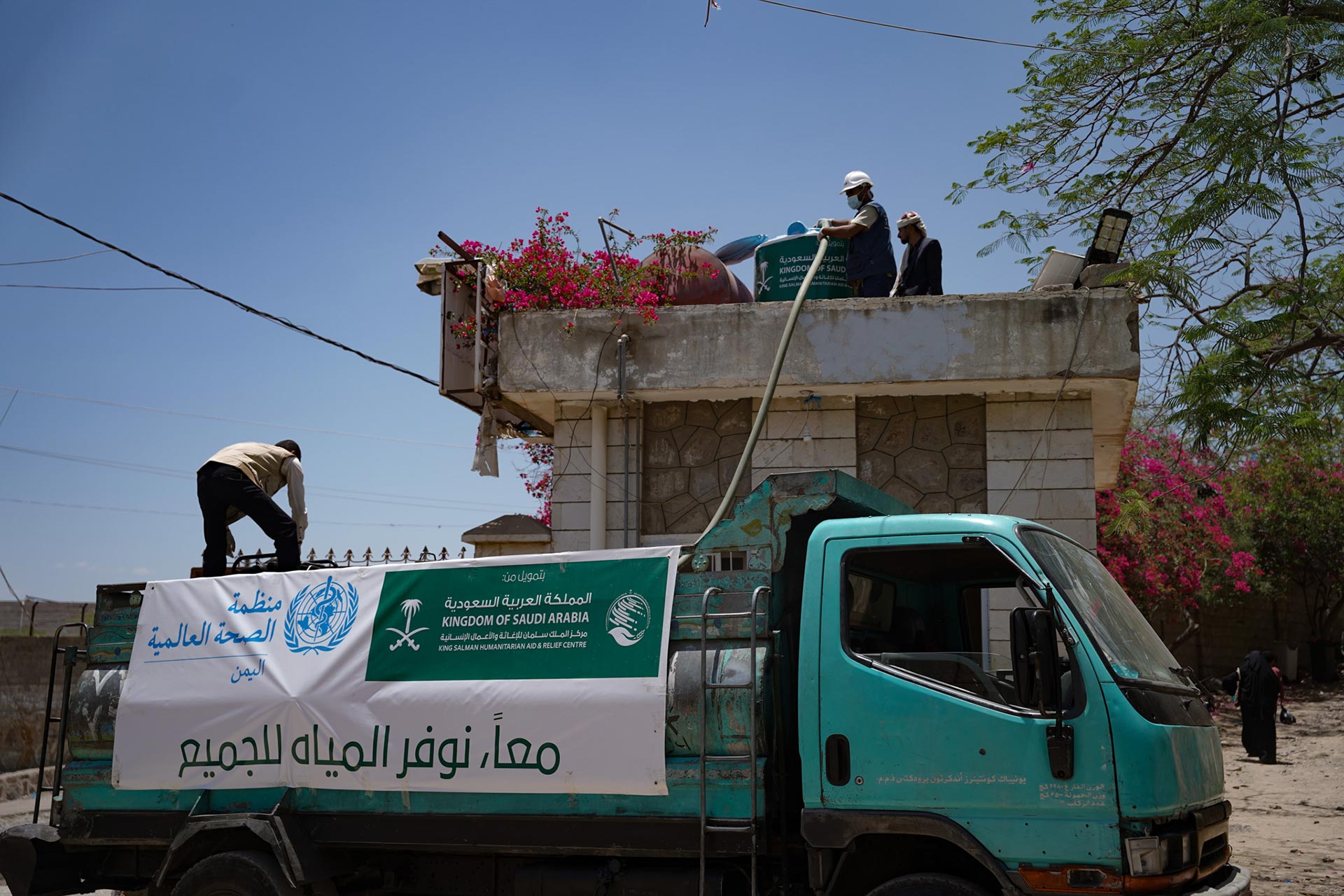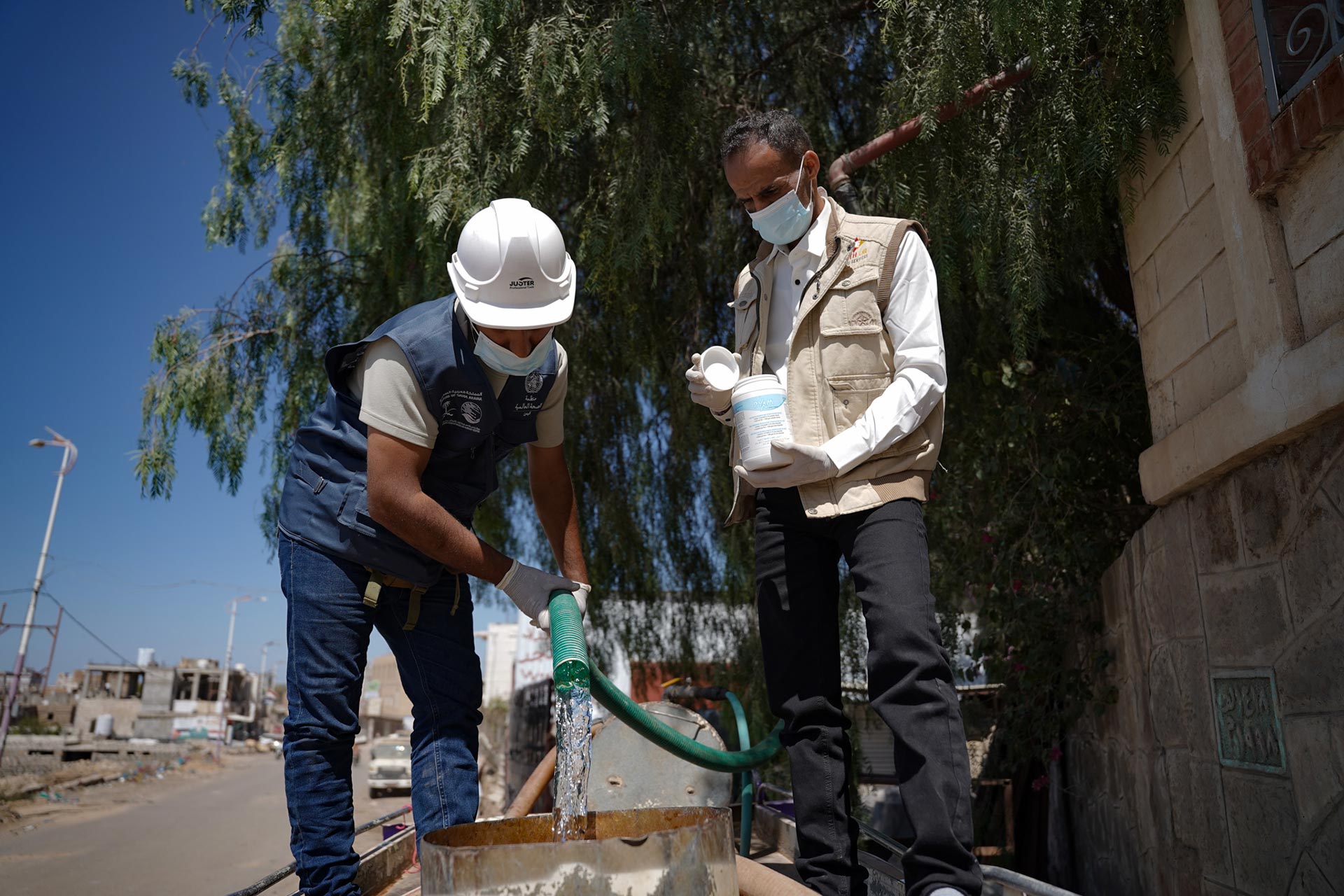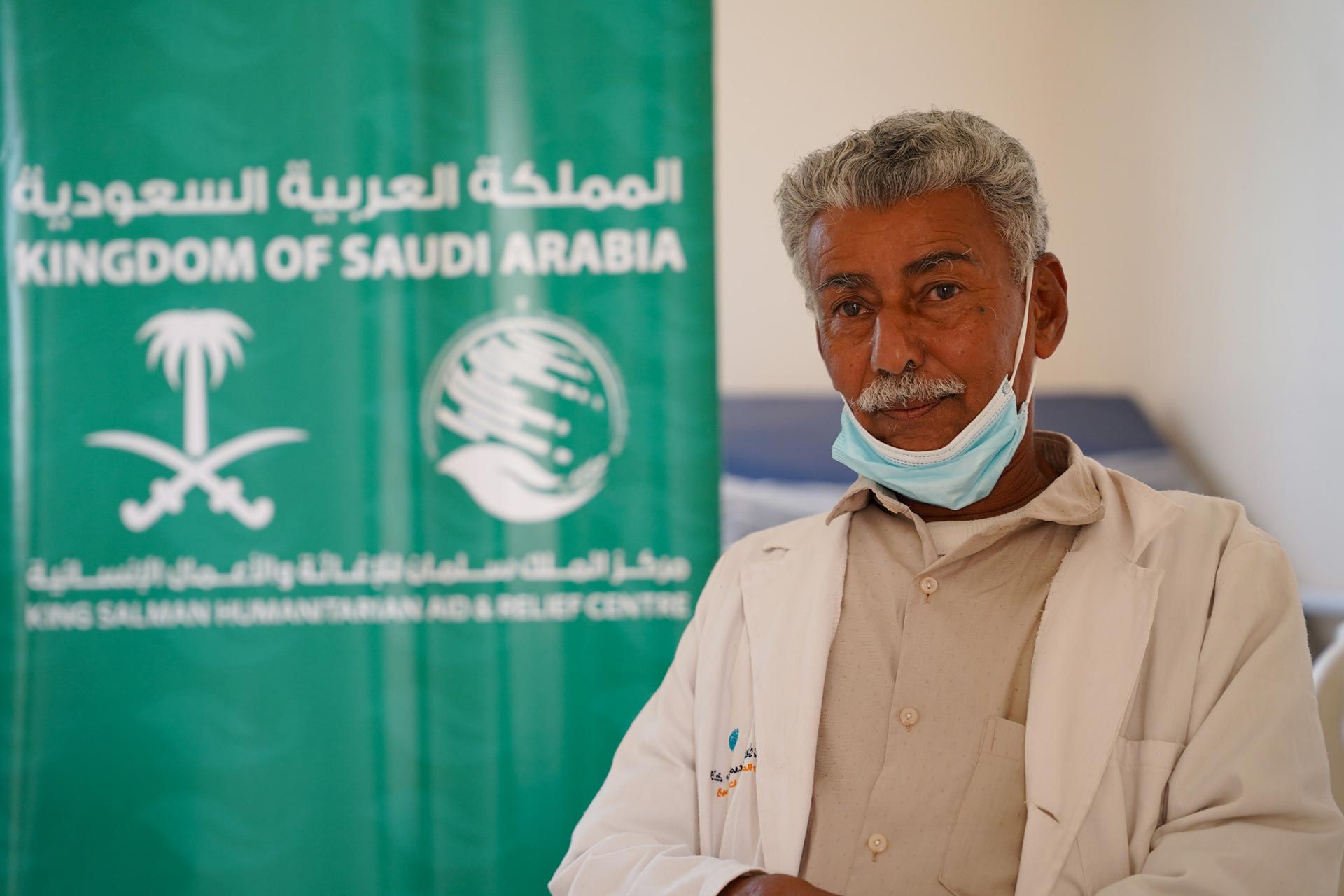World Humanitarian Day 2025: WHO Yemen honors health workers and their dedication to saving lives in times of crisis
 19 August 2025. Aden, Yemen – On World Humanitarian Day, the World Health Organization (WHO) in Yemen is paying tribute to the courage, dedication and sacrifice of health workers and humanitarian personnel who work tirelessly to save lives in one of the world’s most complex emergencies.
19 August 2025. Aden, Yemen – On World Humanitarian Day, the World Health Organization (WHO) in Yemen is paying tribute to the courage, dedication and sacrifice of health workers and humanitarian personnel who work tirelessly to save lives in one of the world’s most complex emergencies.
Over 19.6 million people in Yemen are in need of humanitarian assistance to meet their most basic needs. WHO and its partners continue to work alongside the Ministry of Public Health and Population and other health actors to ensure the delivery of lifesaving health services in the face of escalating needs, insecurity and restricted access.
“Health workers in Yemen are on the frontlines every day – delivering babies, responding to disease outbreaks, treating the wounded and ensuring communities have access to essential care – often at great personal risk,” said Acting WHO Representative in Yemen Office Dr Nuha Mahmoud. “They are the backbone of our humanitarian lifeline. It is their resilience that inspires us to continue our mission.”
This year Yemen has seen multiple disease outbreaks, including cholera, measles and dengue fever, and a growing burden of malnutrition, mental health needs and noncommunicable diseases. On the face of severe challenges, including damaged infrastructure, shortages of medicines and movement restrictions, WHO Yemen has:
supported over 141 health facilities with supplies, equipment and operational costs;
deployed rapid response teams to investigate and contain outbreaks;
strengthened disease surveillance systems for early detection and action; and
provided mental health and psychosocial support services to communities in need.
WHO Yemen mourns the loss of humanitarian colleagues who have given their lives in service to others. In Yemen, incidents of violence against humanitarian personnel continue to threaten the delivery of critical aid.
On World Humanitarian Day, WHO Yemen is calling on all parties to the conflict to uphold international humanitarian law, protect health workers and facilities and ensure safe, sustained access to communities in need.
For media inquiries, please contact:
Communications
Email:
About WHO
Since 1948, the World Health Organization (WHO) has been the United Nations agency dedicated to advancing health for all, so that everyone, everywhere can attain the highest level of health. WHO leads global efforts to expand universal health coverage, direct and coordinate the world’s responses to health emergencies and connect nations, partners and people to promote health, keep the world safe and serve the vulnerable.
UAE and WHO conclude the first phase of a multi-stage joint project to assess and improve the health and nutrition status in Socotra
 14 July 2025– Field teams from the World Health Organization (WHO) and the Erth Zayed Philanthropies of the United Arab Emirates, and in close coordination with Yemen’s Ministry of Public Health and Population (MoPHP) have completed the first phase of a comprehensive baseline assessment in Socotra Island in Yemen. The multi-phase operation will comprise 4 scheduled field visits over a 1-year period by joint both teams.
14 July 2025– Field teams from the World Health Organization (WHO) and the Erth Zayed Philanthropies of the United Arab Emirates, and in close coordination with Yemen’s Ministry of Public Health and Population (MoPHP) have completed the first phase of a comprehensive baseline assessment in Socotra Island in Yemen. The multi-phase operation will comprise 4 scheduled field visits over a 1-year period by joint both teams.
The assessment is the initial phase of a comprehensive programme in Socotra, aiming over the next two to five years to reduce mortality related to poor health and malnutrition by 20% through an integrated health system strengthening approach. The baseline assessment covered 38 enumeration areas (villages) across the 29 sub-districts of Socotra.
Preliminary results show that 93% of targeted health facilities were surveyed. Data were collected from 4,214 households as part of the household listing process. Field teams conducted over 930 caregiver interviews, and took anthropometric measurement from eligible children and mothers, exceeding the initial target, and facilitated 12 focus group discussions with diverse community groups. All 15 planned key informant interviews with relevant and multi-sectoral stakeholders including local and national authorities, donor and UN agencies were completed. The teams also conducted 546 client exit interviews to gather beneficiary feedback on the services provided, exceeding the initial target.
The baseline assessment will now move into the data cleaning, verification and analysis phase, paving the way for a final report that will reveal the current status of the maternal and child health and nutrition status of the community and health facilities readiness and performance, including for health emergencies preparedness and response to guide evidence-based planning for the next phases of intervention, helping ensure that response activities align with identified community needs and health facilities priorities.
Upcoming stages of the joint project implementation include the procurement and distribution of medical and non-medical supplies, recruitment and deployment of technical experts and service providers, technical training programmes and community awareness campaigns. Activities will be implemented in coordination with WHO, the Ministry of Public Health and Population and other partners, ensuring alignment with national health strategies.
The efforts reflect the UAE’s data-driven humanitarian approach, implemented in partnership with leading international health organizations to create sustainable impact and improve public health indicators among the most vulnerable populations.
WHO remains committed to supporting joint efforts that enhance the resilience of the health system and local communities in Yemen and improve health outcomes for all and will continue to work with local authorities and partners to ensure access to all communities, including those in hard-to-reach areas.
WHO and UNICEF launch polio vaccination campaign targeting over 1.3 million children in Government of Yemen-controlled areas
 12 July 2025, Aden, Yemen – A new round of polio vaccination for children begins this week in Government of Yemen-controlled areas.
12 July 2025, Aden, Yemen – A new round of polio vaccination for children begins this week in Government of Yemen-controlled areas.
The 3-day campaign, running from 12 to 14 July 2025, aims to boost population immunity in high-risk areas and prevent further spread of the virus by administering novel oral polio vaccine type 2 (nOPV2) to more than 1.3 million children in 120 districts across 12 governorates. The intervention comes in response to cases in the community and the continued confirmed circulation of variant type 2 poliovirus (cVDPV2) in environmental samples.
“Yemen remains at high risk for poliovirus outbreaks due to protracted conflict, weakened health systems and low routine immunization coverage,” said Acting WHO Representative in Yemen Dr Ferima Coulbibaly-Zerbo. “With poliovirus continuing to circulate and cases confirmed in 2025, these campaigns are essential to interrupt transmission and protect every child from the debilitating effects of polio.”
Since 2021, Yemen has reported a total of 282 cVDPV2 cases across 122 districts in 19 of the country’s 22 governorates, with 98% of cases occurring in children under the age of 5. The overall epidemiological trend highlights the urgent need for nOPV-2 vaccine to halt cVDPV circulation in southern governorates and protect children from the disease.
The campaign is led by the Ministry of Public Health and Population (MoPHP) with support from World Health Organization (WHO) and UNICEF and the Global Polio Eradication Initiative (GPEI).
It will be carried out by almost 7,000 vaccination teams, including over 6,000 mobile door-to-door teams and 800 teams at health facilities. Nearly 2,000 team supervisors and 240 district-level supervisors will oversee the campaign, with technical support from national and partner agencies.
“The campaign is an important and urgent step to protect children from being paralysed by the poliovirus. With confirmed cases of polio among Yemeni children, an imminent threat persists, especially for every unvaccinated child. But, through vaccination, we can keep our children safe,” said Peter Hawkins, UNICEF Representative to Yemen.
WHO and UNICEF, as core partners of GPEI, are fully committed to supporting the Government of Yemen in its efforts to eradicate polio and strengthen routine immunization services. Continued investment and coordinated action are essential to ensure no child is left behind.
About WHO
Since 1948, the World Health Organization (WHO) has been the United Nations agency dedicated to advancing health for all, so that everyone, everywhere can attain the highest level of health. WHO leads global efforts to expand universal health coverage, direct and coordinate the world’s responses to health emergencies and connect nations, partners and people to promote health, keep the world safe and serve the vulnerable.
About UNICEF
UNICEF works in some of the world’s toughest places, to reach the world’s most disadvantaged children. Across more than 190 countries and territories, we work for every child, everywhere, to build a better world for everyone. For more information about UNICEF and its work for children visit http://www.unicef.org/yemen
Media contacts
WHO Yemen:
UNICEF Yemen:
Every drop counts: how clean water is restoring hope to Yemen’s hospitals
 25 June 2025, Aden, Yemen – Before the water trucks started arriving, each morning at the hospital began with uncertainty.
25 June 2025, Aden, Yemen – Before the water trucks started arriving, each morning at the hospital began with uncertainty.
“We used to check the water tanks before we checked on patients,” says Amal, a nurse at a Khalifa Hospital in Yemen. “If there was no water, we had to rethink everything –sterilization, wound care, even washing hands.”
Water, a simple and essential resource, had become increasingly scarce in Yemen’s overburdened health facilities. Without it, health care workers like Amal had to make difficult decisions every day.
“You can’t clean an operating room or safely deliver a baby without water,” she says. “But often, no water was a daily reality.”
Things began to shift when WHO launched to restore access to safe water in hospitals through “Improved WASH Services in Hospitals with Sustainable Water Supply” project, supported by the King Salman Humanitarian Aid and Relief Centre (KSrelief),to serve the most vulnerable populations in Yemen. With this initiative, 60 health care facilities now receive regular trucks of clean water, allowing to better serve 580,000 people, many of them displaced or living in high-risk areas.
A matter of survival
 Before the intervention, water shortages led to critical procedures being postponed and the closure of delivery rooms. Sanitation and basic infection prevention protocols were compromised.
Before the intervention, water shortages led to critical procedures being postponed and the closure of delivery rooms. Sanitation and basic infection prevention protocols were compromised.
“We sometimes had to send patients elsewhere, not because we lacked doctors, but because we had no water,” says Dr. Mohammed, Head of Nursing Department at Taiz Psychiatric Hospital,. “It was painful for everyone involved.”
Today, with regular water deliveries and a water quality control system in place, project hospitals can function more reliably. Disinfection routines are followed, surgical wards are active and basic hygiene is no longer a daily struggle.
“We’ve regained stability. Staff are less stressed and patients are safer,” says Dr.Mohammed.
Delivering more than a water
Behind the scenes are people like Hussein, a water trucking supervisor, who oversees distribution to more than 50 hospitals in 5 governorates.
“Every tank we deliver is tested and treated before use,” he explains. “And when a hospital calls to say they’ve received the delivery, we know we’ve helped someone get care they can trust.”
There have been challenges along the way, rough roads, occasional contamination and the pressure to meet growing needs. But the impact, Hussein adds, makes it worth it.
“Clean water doesn’t just improve services, it protects lives.”
New standards of care
 Amal senses the change in every corner of Khalifa Hospital.
Amal senses the change in every corner of Khalifa Hospital.
“Now we can focus on patient care, not just on coping. We’re able to follow proper hygiene steps and respond quickly in emergencies. That makes a real difference, especially in maternity and surgery.”
Infections are down, Staff morale is up, and for the first time in years, patients-and their relatives are expressing satisfaction with the cleanliness and safety of facilities.
“Even visitors notice,” says Amal. “People are no longer afraid to come here for service.”
Thankful for every drop
“Thank you for seeing this need, for responding before things got worse,” says Amal.
“This wasn’t just about infrastructure,” adds Mohammed. “It was about restoring dignity and trust to health care in Yemen.”
With KSrelief’s fund, safe water has returned to places where hope was fading, and with it, the ability of health care workers to do what they are trained to do. Save lives, safely and with dignity.








